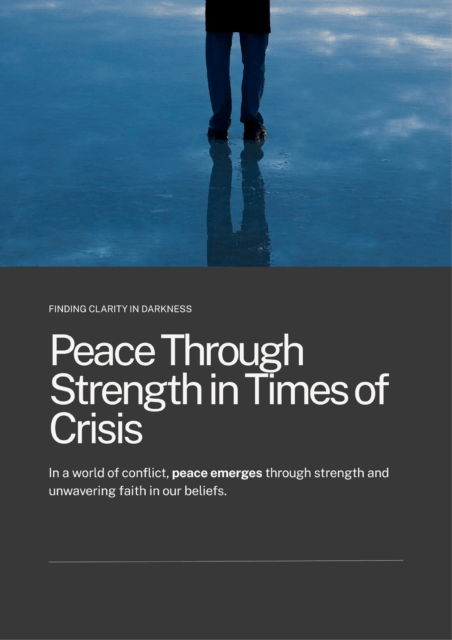Estimated reading time: 3 minutes
Jesus is the Prince of Peace. His teachings call us to love our enemies, forgive endlessly, and turn the other cheek. And yet, in a fallen world, we’re also called to stand against evil, to defend the vulnerable, and at times, to resist those who would bring destruction. This is where the concept of peace through strength comes into play, balancing the call for peace with the necessity of strength.
The night Jesus was arrested in the Garden of Gethsemane (Luke 22:47–51), His disciples were armed—but their weapons were not meant to lead the mission. Jesus stopped the violence with a command and a healing touch, modeling restraint. Still, this passage raises a sobering truth: sometimes peace must be defended with strength.
Jesus’ Followers Were Armed—Yet Called to Restraint
When Jesus’ disciples asked, “Lord, should we strike with our swords?” (Luke 22:49), they recognized danger. They had prepared, even carrying swords per Jesus’ earlier instructions (Luke 22:36–38). But Jesus’ rebuke—“No more of this!”—makes clear that defense is not domination. We are not to be aggressors. But being prepared for danger is not a sin; it’s wisdom. The sword is not our first answer—but neither should we pretend evil doesn’t exist. It all comes back to peace balanced with strength.
Resisting Evil: When Peace Must Be Defended
History gives us chilling examples of what happens when evil goes unchecked. What would the world look like if no one had stood against Genghis Khan’s conquests or Hitler’s genocidal regime? Silence and passivity in the face of injustice are not virtues. Hence the belief in securing peace through strength.
The Bible, too, is filled with those who stood up to evil under God’s direction:
- Moses stood up to Pharaoh to free an enslaved people.
- David faced Goliath not for his own glory, but to defend Israel from an enemy of God.
- Esther risked her life to stop the massacre of her people.
- Jesus Himself flipped tables in the temple, confronting corruption in God’s house.
None of these actions were out of selfish aggression. Each was a response to injustice—anchored in God’s righteousness, not human anger. They embodied the principle of peace through strength.
Strength Submitted to the Spirit
The key is not whether we ever resist evil, but how and why we do so. Scripture warns that vengeance belongs to the Lord (Romans 12:19). When we act, it must be in alignment with God’s heart—defending, not retaliating; protecting, not provoking. This aligns with seeking peace through the strength given by the Spirit.
The Apostle Paul says, “Do not be overcome by evil, but overcome evil with good” (Romans 12:21). That doesn’t mean passive surrender. It means our response must be righteous, redemptive, and Spirit-led. We can stand firm (Ephesians 6:13) while still loving our enemies and praying for those who persecute us.
Living as Peacemakers with Courage
Christians are called to be peacemakers (Matthew 5:9)—but never at the expense of truth or justice. True peace is not the absence of conflict; it’s the presence of righteousness. Jesus did not shrink back from confronting sin or exposing darkness, and neither should we. We achieve peace through strength in those moments.
In today’s world, evil still raises its head—in war, corruption, oppression, and spiritual deception. We must be wise and ready, courageous and compassionate. We pursue peace—but we do not surrender to evil.
Let us walk in the way of Christ: bold in truth, anchored in love, ready to defend the innocent, committed to strength, and the peace God provides.









Leave a comment